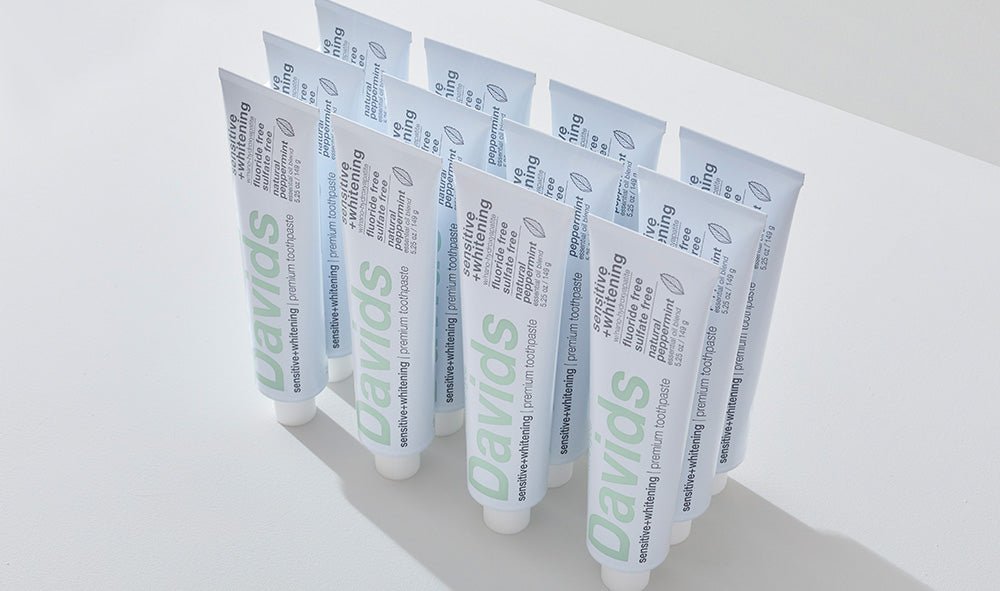We’re thrilled to now offer a natural, non-toxic treatment for your sensitive teeth.
Davids Sensitive+Whitening toothpaste utilizes an innovative nano-hydroxyapatite (n-HA) formula to repair your enamel from within, provide long-term tooth sensitivity relief, and reduce bacteria and plaque buildup in your mouth.
Maybe you’re wondering, “If hydroxyapatite is so great, why haven’t I heard of it?” Don’t worry, we’ve asked ourselves the same thing. We truly don’t understand why this hero ingredient takes the backseat to fluoride in the world of oral health, so naturally, we’re here to give it some of the attention it deserves!
Let’s dive into the nitty-gritty of nano-hydroxyapatite…how exactly it works, what sets it apart from the ingredients in conventional “sensitive toothpaste,” and how it outperforms its ingredient competitors (at least in our book).
how does nano-hydroxyapatite work?
Hydroxyapatite is a type of calcium that composes 97% of your tooth enamel, the hard outer shell of your tooth that protects the nerves. (Note: nano-hydroxyapatite is simply hydroxyapatite with tiny particle sizes between 20-80 nanometers, so we use the two terms interchangeably.)
Your teeth have tiny tubules that act as passageways to your tooth’s center nerve. When these tubules are exposed (which happens when your gums recede and/or your enamel is worn down), it leaves your tooth’s super-sensitive nerve vulnerable to outside stress and pain.
Unlike other chemicals found in conventional toothpaste, nano-hydroxyapatite actually binds to your enamel and penetrates down to the innermost part of your dental cavity. By doing so, it can remineralize and repair your enamel from within, plugging the tubules to create a fortified shield for your tooth’s center nerve. This process actually repairs the damage and relieves your sensitivity, instead of serving as a band-aid solution like many conventional “sensitive” ingredients.
Below, you can see a real before and after visual representation of how Davids hydroxyapatite toothpaste can effectively plug the tubules and remineralize the enamel in as little as five days.


In addition to its ability to deliver enamel repair, nano-hydroxyapatite also binds to plaque and bad bacteria in your mouth, breaking it down and preventing buildup that can lead to cavities and tooth decay. Oh, and it does all of this while preserving a healthy balance in your oral microbiome because it isn’t a harmful chemical that wipes out everything it touches. This is great news because your oral and gut microbiomes rely on good bacteria and microorganisms to thrive!
how does hydroxyapatite toothpaste differ from conventional sensitive toothpaste?
As explained above, hydroxyapatite toothpaste takes a revolutionized approach to remineralizing your enamel to provide tooth sensitivity relief.
Conventional sensitive toothpaste uses chemical numbing agents (like potassium nitrate) to temporarily numb your sensitive teeth over and over, while toothpaste with hydroxyapatite repairs the issue at the source. By plugging the tubules that lead to your tooth’s nerve center, nano-hydroxyapatite blocks the path to your tooth’s nerve center, so irritating substances (hot and cold liquids, sugar, etc.) cannot reach your precious nerve.
Not to mention, hydroxyapatite is a naturally occurring mineral, and it’s biocompatible to your body. In other words, it safely interacts with the living tissue in your body (your gums, tongue, mouth, digestive tract, etc.), so it’s safe and effective for long-term tooth sensitivity relief and enamel repair.
This is unlike those conventional sensitive toothpastes we mentioned earlier, as potassium nitrate is a synthetic drug and can be absorbed through your gums into your bloodstream. We much prefer the natural alternative (and have a feeling you will, too).
how does toothpaste with hydroxyapatite compare to fluoride toothpaste?
There’s no doubt that fluoride also strengthens enamel and effectively reduces cavities. That’s why it’s such a popular ingredient in the world of dental hygiene! In fact, the ADA will only give its stamp of approval to toothpastes that contain fluoride.
But research shows that hydroxyapatite and fluoride are equally effective in remineralizing your teeth. Compared to other ingredients that target enamel repair and tooth sensitivity relief (like fluoride), here are a few reasons hydroxyapatite stands out.
- It’s non-toxic. You already know we believe in non-toxic oral and self-care. If it’s toxic, can you really call it “care”? Hydroxyapatite is biocompatible, so you don’t even have to worry about ingesting it (even in large quantities). This makes it safe for everyone, even young kids and pregnant women! Fluoride, on the other hand, requires a poison control label.
- It naturally exists in your body. Let’s work with what we already have in our bodies. Your enamel is already 97% hydroxyapatite, so why not fortify it?
- It’s gentle on your oral microbiome. Hydroxyapatite isn’t a harmful chemical, so it doesn’t automatically wipe out all of the organisms in your mouth (like most conventional toothpastes and mouthwashes). This is super important because we want to maintain a healthy balance of bacteria in your oral microbiome to nurture your gut and holistic health.
- It’s inherently whitening. This study reveals that hydroxyapatite alone can lighten the shade of your teeth, even without the help of any other whitening ingredients. However, our other whitening ingredients such as baking soda, calcium carbonate, and hydrated silica add an extra whitening bonus!
- It has a cool+clean history. Hydroxyapatite was developed by NASA in 1970 (about 15 years after fluoride was introduced in toothpaste), and astronauts used it as a supplement to remineralize and repair their bones and teeth after returning from zero-gravity missions. Over time, NASA and its astronauts found it effective in doing so, and shortly after, hydroxyapatite made its way into commercial toothpaste.
Hydroxyapatite not only has a cooler history than its (in)famous competitors, it actually has an impressive reputation. It’s non-toxic, it does not pose the risk of nasty side effects, yet it’s proven to be just as effective at doing its job. Why wouldn’t you want to give this natural alternative a try?







